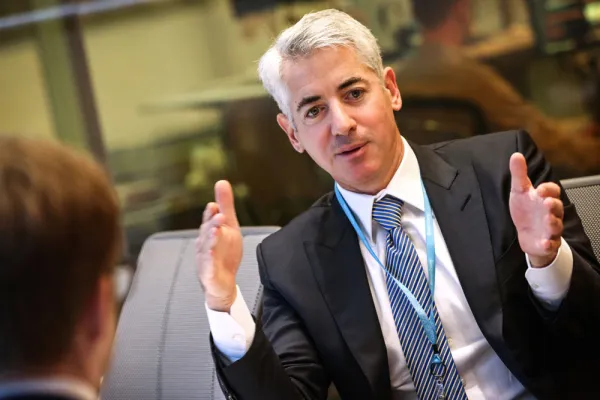Most asset managers and hedge fund directors don’t try to attract new investors with a four-minute animated video. But most aren’t New York–based Lyrical Asset Management, co-founded by two friends from the University of Pennsylvania, Andrew Wellington and Jeff Keswin.
As the firm’s video suggests, “Sometimes it’s a good idea to go against the grain and challenge conventional wisdom.” Founded in 2008, Lyrical’s office spans the entire 37th floor of a Midtown Manhattan building that also houses Soros Fund Management. There are sweeping vistas of the city, art sculptures, and pinball and whack-a-mole machines, all making it feel more like a hip tech firm than one providing financial services.
And yet Lyrical isn’t exactly high-tech in its approach to investing. While many asset managers rely on high-frequency trading to produce gains, Lyrical focuses on value investing, typically making just four trades a year. It holds most of its stocks for seven years on average, says Wellington, the firm’s chief investment officer, adding that its portfolio consists of shares in 33 companies that are initially evenly weighted at 3 percent each. No adjustments are made to the holdings as the original weights shift with the rise and fall of the market.
Unlike most asset managers, “we don’t conviction rate our portfolio,” says Wellington, 49, meaning the firm doesn’t show preference for any one company by investing more heavily in its shares.
The firm’s formula of tight control, choosing value stocks, engaging in minimal trading, and buying for the long haul has worked well most years. “We’ve had six good years and two, in 2011 and 2015, have been bad,” says Wellington, attributing the down years to an inability to “overcome the headwinds of value being out of favor.”
Last year Lyrical’s U.S. Value Equity Fund returned 16 percent, beating the Standard & Poor’s 500 index by about 6 percentage points. The firm had similar success from 2012 to 2014, producing a 27.6 percent gain that exceeded the S&P 500’s 20.4 percent return. Meanwhile, its management fee of 0.75 percent is less than half the industry average. The result has been growth: assets have more than doubled to $6.5 billion this year, from $3 billion in January 2015.
Investors can access Lyrical’s U.S. Value Equity Fund through a mutual fund, limited partnerships, and managed accounts. The minimum investment for the mutual fund is $2,500; limited partners must invest at least $2.5 million; and a minimum of $5 million is required for managed accounts. Institutional investors own 75 percent of its funds, with the remaining 25 percent of assets stemming from wealth managers.
While Lyrical trades infrequently, specific instances can trigger the sale of a stock in its holdings. The firm divests shares if they rise to a level where they are fairly valued or overvalued, and if a company in its portfolio is acquired. Finally, Lyrical unloads a stock if it realizes it has made a mistake or finds “superior substitutes,” according to Wellington.
To determine which equities to buy and at what price, Lyrical relies on “the first principles of finance,” or looking at a company’s cash flow, he says. The firm projects a company’s earnings over five years after analyzing what the business has done in the past and how it’s positioned today. To reduce variables, Lyrical targets companies with more predictable earnings. “If a business is cyclical, it’s harder to get things right,” he says. For example, it can be tricky to predict the earnings of pharmaceutical companies. “I know how much they’re earning today, but if they go off patent, and you don’t know what’s coming, it’s hard to get right,” he adds.
Exemplifying successful picks in its holdings is semiconductor company Broadcom, whose share price of around $219 on March 8 was up 57 percent from a year earlier, and Lincoln National, which gained 27 percent last year. Broadcom possesses an “incredible history of growing earnings,” Wellington says, “and is still at a nice discount to market multiples.” He says Lincoln National has “low double-digit returns on investment, with a simple, steady business of life insurance and annuities.”
Lyrical, of course, isn’t alone in holding onto stocks for extended periods. “Warren Buffett does it, we do it, and so does a tiny minority,” says Wellington. His partner, Keswin, who had earlier co-founded Greenlight Capital with activist investor David Einhorn, oversees operations at Lyrical. When the duo started the firm with $5 million in assets, the goal was to manage $1 billion. Now it’s to keep the doors open, says Wellington, before quoting an old proverb: “Man plans and God laughs.”






